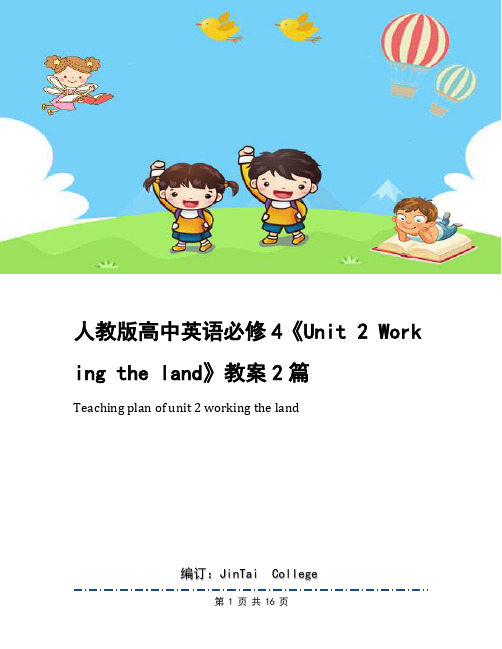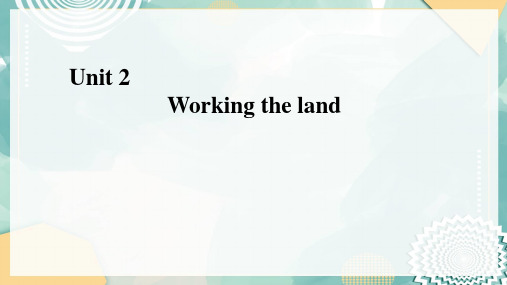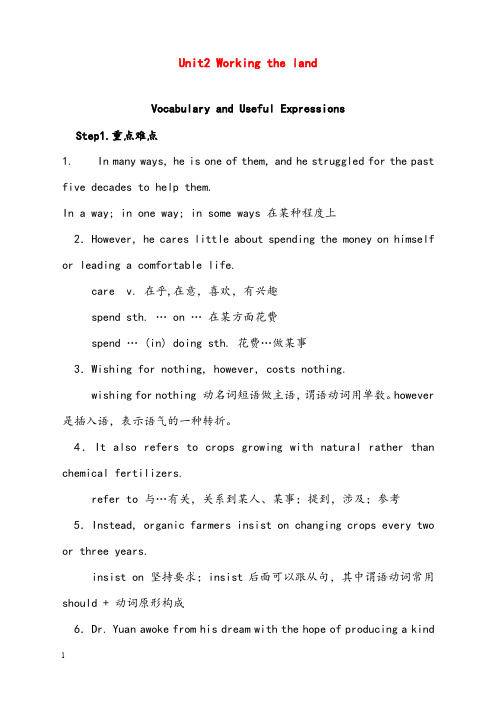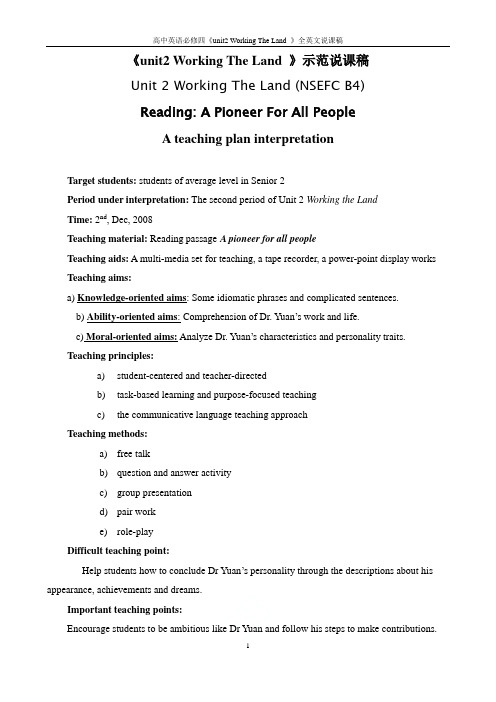人教版英语必修四新素养同步讲义:Unit 2 Working the land 4 Section ⅣGrammar含答案
人教版高中英语必修4《Unit 2 Working the land》教案2篇

人教版高中英语必修4《Unit 2 Work ing the land》教案2篇Teaching plan of unit 2 working the land编订:JinTai College人教版高中英语必修4《Unit 2 Working the land》教案2篇前言:英语作为在许多国际组织或者会议上都是必需语言,几乎所有学校选择英语作为其主要或唯一的外语必修课。
英语教学涉及多种专业理论知识,包括语言学、第二语言习得、词汇学、句法学、文体学、语料库理论、认知心理学等内容。
本教案根据英语课程标准的要求和教学对象的特点,将教学诸要素有序安排,确定合适的教学方案的设想和计划、并以启迪发展学生智力为根本目的。
便于学习和使用,本文档下载后内容可按需编辑修改及打印。
本文简要目录如下:【下载该文档后使用Word打开,按住键盘Ctrl键且鼠标单击目录内容即可跳转到对应篇章】1、篇章1:人教版高中英语必修4《Unit 2 Working the land》教案2、篇章2:人教版高中英语必修4《Unit 2 Working the land》教案篇章1:人教版高中英语必修4《Unit 2 Working the land》教案教学准备教学目标(1)知识目标:让学生通过阅读课文更多地了解我国著名的农业科学家袁隆平的科研成果及其影响。
(2)能力目标:让学生进一步使用恰当地阅读方式与技能,如略读(skimming),快速阅读(fast reading),细读(close reading)等(3)情感目标:让学生不但学习袁隆平的科研精神,更要学习他不计较名利,踏踏实实的生活态度。
教学重难点1.阅读课文更多地了解我国著名的农业科学家袁隆平的科研成果及其影响。
教学过程1.话题的引导。
(Pre-reading)1).开头通过设计了一首熟悉的诗歌,让学生知道话题---farming.2).涉及到提高产量从而解决世界饥荒问题,从而引出本节课的中心话题--伟大人物袁隆平。
人教版英语必修四新素养同步讲义:Unit 2 Working the land 2 Section Ⅱ含答案

Section ⅡWarming Up & Reading—LanguagePointsstruggle v i.& n.斗争;拼搏;努力(经典例句)She never gave up and struggled to lead an active life.她从来没有放弃,努力过着一种积极的生活。
struggle for努力争取……;为……而斗争struggle against 与……作斗争struggle with 与……作斗争struggle to do sth. 努力做某事struggle to one’s feet 挣扎着站起来①We have to struggle with all kinds of difficulties from home and abroad.我们必须和来自国内外的各种各样的困难作斗争。
②She is struggling to bring up a family on a very low income.她靠着非常微薄的收入艰难地供养一家人。
[即学即练]——单句语法填空①Her mother has been struggling against/with her illness for many years.②Workers are struggling for a clean canteen and healthy food.③Some farmers have to leave their hometown and go to work in cities, struggling(struggle) to increase their incomes.[能力提升]——微写作④他被一辆摩托车撞倒后受了重伤,不得不挣扎着站起来。
Knocked down by a motorbike, he was badly hurt and had__to__struggle__to__his__feet.disturbing adj.引起烦恼的;令人不安的(教材P10)At that time, hunger was a disturbing problem in many parts of the countryside.当时,饥饿是困扰许多农村地区的问题。
人教版高中英语必修四《Unit2Workingtheland》课件

基础知识排查
nutrition nutritious
discovery
output
discover inp法与语法突破 语法填空突破
基础知识排查
withthehopeof searchfor besatisfiedwith buildup turnto focuson
句法与语法突破
基础知识排查 重点单词突破 重点短语突破 句法与语法突破 语法填空突破
句法与语法突破
基础知识排查 重点单词突破 重点短语突破 句法与语法突破 语法填空突破
句法与语法突破
基础知识排查 重点单词突破 重点短语突破 句法与语法突破 语法填空突破
语法填空突破
基础知识排查 重点单词突破 重点短语突破 句法与语法突破 语法填空突破
高中英语课件
(金戈铁骑 整理制作)
基础知识排查 重点单词突破 重点短语突破 句法与语法突破 语法填空突破
英语人教版
Book4 Unit2 Workingtheland
基础知识排查
decade freedom rid therefore nationality regret
基础知识排查 重点单词突破 重点短语突破 句法与语法突破 语法填空突破
重点单词突破
重点掌握的单词
基础知识排查 重点单词突破 重点短语突破 句法与语法突破 语法填空突破
重点单词突破
基础知识排查 重点单词突破 重点短语突破 句法与语法突破 语法填空突破
重点单词突破
基础知识排查 重点单词突破 重点短语突破 句法与语法突破 语法填空突破
重点单词突破
基础知识排查 重点单词突破 重点短语突破 句法与语法突破 语法填空突破
重点单词突破
人教版高中英语必修四同步课件:Unit 2 Working the land Section Ⅳ

[温馨提示] (1)动词-ing 形式的复合结构可在句中作主语或宾语。作主 语时,不能用③④两种形式。 (2)无生命名词无论是作主语还是作宾语都不能用第②种形 式。 ◆Tom's winning the first prize last year impressed me a lot. 汤姆去年得了一等奖使我印象深刻。 ◆Do you mind my/me/Jack's/Jack leaving now? 你介意我/杰克现在离开吗?
[温馨提示] (1)不定式作主语表示具体的或一次性的动作。 ◆To lie to her is wrong. 对她撒谎不对。 (2)动名词作主语时,谓语动词用单数。 ◆Climbing mountains is really difficult for the old. 对于老人来说爬山确实困难。
四、动词-ing 形式的否定形式 动词-ing 形式的否定形式通常是在其前加 not,带有逻辑主 语时 not 应放在逻辑主语和动词-ing 形式之间。 ◆You have no excuse for not going. 你没有理由不去。 ◆He was punished for not having done his homework. 他因未完成作业而受到惩罚。
◆I still remember visiting the museum for the first time.我仍 记得第一次参观博物馆的情景。
6.下列动词可接动词-ing 形式的主动形式表示被动意义, 相当于不定式的被动形式。
need/want/require/deserve doing = need/want/require/deserve to be done ◆The bike needs repairing/to be repaired. 这辆自行车需要修一下。
新人教版高中英语必修四unit 2《working the land》优秀教案2(重点资料).doc

Unit2 Working the landVocabulary and Useful ExpressionsStep1.重点难点1. In many ways, he is one of them, and he struggled for the past five decades to help them.In a way; in one way; in some ways 在某种程度上2.However, he cares little about spending the money on himself or leading a comfortable life.care v. 在乎,在意,喜欢,有兴趣spend sth. … on …在某方面花费spend … (in) doing sth. 花费…做某事3.Wishing for nothing, however, costs nothing.wishing for nothing 动名词短语做主语,谓语动词用单数。
however 是插入语,表示语气的一种转折。
4.It also refers to crops growing with natural rather than chemical fertilizers.refer to 与…有关,关系到某人、某事;提到,涉及;参考5.Instead, organic farmers insist on changing crops every two or three years.insist on 坚持要求;insist后面可以跟从句,其中谓语动词常用should + 动词原形构成6.Dr. Yuan awoke from his dream with the hope of producing a kindof rice that could fees more people.with the hope of 带着某种希望7.He used to walk to his fields twice a day, but now he prefers to ride his motorcycle.used to 过去常常(现在已经不是如此)be used to doing 意思是“习惯于”prefer to do (rather than do) 相比之下更喜欢做某事8.But whatever they grow they make sure that what is left in the ground after harvesting becomes a natural fertilizer for the next year’s crop.whatever引导让步状语从句,表示“无论怎样”,相当于no matter what. Eg: Whatever you do, don’t give up.Step 2.功能句型建议(Suggestion & advice)I would rather … I don’t like … because …I’d prefer … because … It’s a great pity that …Should we/I …? It’s better to …If I have a choice I’d choose … because … You need to …May I suggest …? Let me suggest … because …Perhaps we should suggest … because … But what/how about …?Step 3. 重点单词及短语单词① hunger n. 饥饿,食欲;v. 渴望得到某事物,某人hunger for/after sth./sb.② struggle vi.stuggle with sb. 与某人争斗,搏斗struggle (against/with sb./sth.)struggle against/with sb./sth. (for sth.) 争斗,拼搏,奋斗,努力③ expand vi. (使某事物)变大,增强,伸展,张开expand on sth. 阐述或详述expansion n. 扩大,扩展,膨胀④ equip vt.equip sb./sth. (with sth.) 配备,装备equipment n. 设备,装备⑤ export vt. 输出;n. 出口业,出口品import vt. 进口⑥ circulate vi. vt. 使某物循环,流通,传播;vt. 发侧知告知某人 circulation n. 循环,流传,传播⑦ confuse vt. 把某人弄糊涂,使为难,打乱confusion n. 混乱,混淆⑧ reduce vt. 缩减,减小,降低reduction n. 减少,缩小⑨ supply vt. 供给,供应,满足;n. 供应,供给之物⑩ exchange vt. 交换,交易;n. 交换,更换,互访,交流 exhange sth. with sth.exchangeable adj. 可交换的,可退换的,可兑换的短语rid … of 清除,摆脱be satisfied with = be contented 感到满足,满意的would rather do sth. 宁可做某事refer to 与…有关,关系到某人,某事,提到,参考search for 寻找,搜寻thanks to 多亏,由于rather than 而不,宁愿…而不Unit2 Working the landWarming Up, Pre-reading and Reading Period 1 Warming up and pre-reading.Step 1 Lead-in.Poem By Li ShenFarmers weeding at noon,Sweat down the field soon. Who knows food on a tray,Due to their toiling day.Then let one student recite the poem in Chinese.Step 2 Warming up by questioningHello, everyone. We shall read about man who works the land today. Have you ever grown any plants? If not, what kind of plant would you like to grow? How will you grow it?(For reference: Mr. Li, I worked with my father in the rice field last year. We grow hybrid rice and use animal wastes to make the soil rich.)Has anyone of you ever been to the countryside? What did you do there? (For reference: I went to Chuankou the day before yesterday. It is a small mountain village 75 li north of Beijing. I went there to visit my uncle’s family. I like that small beautiful village very much. )Who are from a farmer’s family? What do you know about farming? Step 3 Pre-reading and talkingQuestioning and answeringRice is main food in South China. What do you think would happen if tomorrow there was suddenly no rice to eat?(For reference: Then the south people would have to change their eating habit. They could turn to potatoes, wheat flour, cow and sheep cheese, cabbage, onions and garlic for food. They are the bases ofthe traditional food in North China. )If you had the chance to do one thing to help end hunger in the world, what would you do?(For reference: I would try to end hunger by popularizing the advanced farming techniques. Modern techniques could be introduced to increase the rice output, and expand the area of fields.)Giving background information about Professor Yuan Longping Have you ever heard of a man called Professor Yuan Longping? Would anyone of you tell the class something about him?(For reference: Professor Yuan Longping is a Chinese agricultural scientist. Professor Yuan's breakthrough scientific achievement led to the world's first successful and widely grown hybrid rice varieties, revolutionizing rice cultivation in China and tripling production over a generation. His approach to rice breeding then spread internationally throughout Asia and to Africa and the Americas, providing food for tens of millions and leading to his becoming known as the "Father of Hybrid Rice."Step 4. ReadingReading aloud to the recordingComprehension—understanding what you are reading—is important. To read in thought groups is an easy, yet effective, way of improving reading comprehension. Now turn to page 9 and read aloud to therecording of the text A PIONEER FOR ALL PEOPLE. Pay attention to the thought groups in the sentences while listening and reading aloud.A brief introduction:Yuan Longping is known as China’s “father of hybrid rice”. It’s said that in China, we eat depending on “Two Ping” ---- Deng Xiaoping, who made the policy of System of Production Responsibility, & Yuan Longping, who invented hybrid rice.Yuan Longping, who was born in September, 1930, graduated from Agriculture Department in Southwest Agricultural Institute. He has been working on agriculture education & the research into hybrid rice since he left the institute.In the 1960s, when China was suffering from serious famine, he came up with the idea of hybrid rice, which has a high yield ( or output). Ten years later, he succeeded in inventing a new species that produced a 20 percent higher yield than common types of rice. Yuan devoted himself to the research into agriculture, & was honored by UNESCO & FAO(联合国教科文组织). Although he is 74 years old, he is still working on the research into agriculture.Period 2 ReadingStep 1 Lead-in。
人教版高中英语必修四课件:Unit-2-Working-the-land-Words-and-exp

regrettable adj 可惜的;令人遗憾的
10.build up 逐渐增强;建立;开发
1) Try and build up confidence a bit . 试试让他增进自信。 2) Good food builds up the body. 好的食物使身体更加强壮。 3) She’s built up a very successful business. 她创办的生意很红火。
近义词组:be content with 同根词:satisfy vt. 满足;使满意;
satisfaction n. 满意;满足 be satisfied to do对做……感到满意。如:
2) He was satisfied to win the race. 他对赢得赛跑感到满意。
6.would rather 宁愿,宁可
与…斗争,为反对…而斗争, struggle for 为争取…而斗争
2.expand vt&vi 使变大;伸展
1) Metals expand when heated. 金属受热则膨胀。 2) The sofa expands to form a bed . 沙发展开形成一张床。
搭配:expand …into 把…扩展/膨胀为… His studio was expanded into a big firm. 他的工作室扩大规模而成为一家大公司了。 拓展:expansion n 扩大;扩张;扩展
7.therefore adv. 因此;所以;因而
1) we don’t have enough money and therefore we
高中英语必修四《unit2 Working The Land 》全英文说课稿

《unit2 Working The Land 》示范说课稿Unit 2 Working The Land (NSEFC B4)Reading: A Pioneer For All PeopleA teaching plan interpretationTarget students: students of average level in Senior 2Period under interpretation: The second period of Unit 2 Working the LandTime: 2nd, Dec, 2008Teaching material: Reading passage A pioneer for all peopleTeaching aids: A multi-media set for teaching, a tape recorder, a power-point display works Teaching aims:a) Knowledge-oriented aims: Some idiomatic phrases and complicated sentences.b) Ability-oriented aims: Comprehension of Dr. Yuan’s work and life.c) Moral-oriented aims: Analyze Dr. Yuan’s characteristics and personality traits.Teaching principles:a)student-centered and teacher-directedb)task-based learning and purpose-focused teachingc)the communicative language teaching approachTeaching methods:a)free talkb)question and answer activityc)group presentationd)pair worke)role-playDifficult teaching point:Help students how to conclude Dr Yuan’s personality through the descriptions about his appearance, achievements and dreams.Important teaching points:Encourage students to be ambitious like Dr Yuan and follow his steps to make contributions.Exploring work before class:•New words & expressions•Assigned the students to surf on the Internet to find out some information about Chinese agriculture and Yuan Longping.Aims: 1. Remove the language obstacles before class and develop students’ habit of self-study.2. Gain some background information about Yuan Longping.Teaching procedures:Step 1: Lead-in (2m’)Show pictures of hungry Africans and draw out Dr. Yuan.Aim: To grab students’ attention and lead in the topic of the passage.Step 2: Task-based reading (7m’+ 5m’+8m’)1. First reading (group work and discussion) (7m’)The students will be given 7 minutes to skim for:1) the main idea of the whole passage (4m’)2) the main idea of each paragraph (3m’)Aim:To enable students to get a general idea and the organization of the passage.2. Second reading (individual work and chart filling) (5m’)Students will be divided into 4 groups to finish 4 different tasks. This time more detailed information is called for. After the reading, there will be different tasks for different groups. Group 1: Dr Yuan’s appearance and Dr Yuan’s achievementGroup 2: Dr Yuan’s biographyGroup 3: Dr Yuan’s personalityGroup 4: Dr Yuan’s dreamsAim: This task is aimed to develop students’ ability of reading for useful information within a limited time. Meanwhile, the teacher can help to remove the language obstacles in the reading passage.3. Dig-in reading (pair work and personality recognition) (8m’)How do you like Dr. Yuan? What characters can you conclude from these sentences?Try to summarize Dr. Yuan’s characteristics.Aim: To enable students to get a deeper understanding of Dr. Yuan and appreciate his noble personality.Step 3: Movie watching (3m’)A 3-minute short movie about Dr. Yuan will be played in order that the whole class may know him better.Aim: To know Dr. Yuan better in a vivid way.Step 4: An interview (pair work and role-play) (5m’+5m’)Suppose Dr. Yuan will visit our school and he will answer the questions after a speech.Prepare some questions, which may cover his life, agricultural research work, even his hobbies or love story and then show your interview.Aim:1. The interview focuses on teamwork, cooperation and collaboration.2. The purpose is to develop the students’ random thinking skills and practice their oral English.Step 5: Feedback (number game) (4m’)The students will play a number game--- What’s your lucky number? There are nine numbers to choose from and each number represents a different task. The task is mainly about the words, phrases and comprehension of the passage.Aim:To check the teaching effect and consolidate students’ basic knowledge about words and sentences.Step 6: Self assessment and assignment (1m’)Check out how much you have learned in class!Write an article which is entitled Dr. Yuan in my eyes.Aim: 1.To expand the information and to broaden students’ minds.2.To consolidate the knowledge and help improve students’ writing.。
人教版高中英语必修四Unit2Workingtheland知识点串讲讲义

Book4 Unit 2 Working the landStep3.Researching cooperatively& answering questions(合作探究, 解决问题)Learn the usages of the following language points and answer some questions in groups.1.At that time, hunger was a disturbing problem in many parts of the countryside.(P10)当时饥荒是许多农村地区面临的严重问题。
【词语拓展】hunger n./v.饥饿;渴望;使……饥饿hungry adj.饥饿的;渴望的die of hunger 死于饥饿hunger for/after sth.渴望go hungry挨饿【小试身手】根据括号内的汉语提示完成句子。
〔1〕The little boy who ran away from home soon felt ____________ .〔饥饿〕〔2〕It,s terrible to_________ news when the family,s letters don,t arrive.〔渴望〕〔3〕Many people in Africa had to(挨饿) ________and some even _________(死于饥饿)because of the lack of grain.2.Dr.Yuan searched for a way to increase rice harvestswithout expanding the area of fields.(P10)袁博士在不增加土地面积的根底上寻求到达增收的途径。
【词语拓展】search for;in search of;look forsearch for 搜寻〔动词词组〕in search of 搜寻〔介词词组〕search...for 搜查某地/某人寻找某物The dogs were in the forest in search of/looking for/searching for clues of the criminals.=The dogs searched the forest for clues of the criminals.=The dogs were in the forest to look for clues of the criminals.【小试身手】选用上述短语填空。
- 1、下载文档前请自行甄别文档内容的完整性,平台不提供额外的编辑、内容补充、找答案等附加服务。
- 2、"仅部分预览"的文档,不可在线预览部分如存在完整性等问题,可反馈申请退款(可完整预览的文档不适用该条件!)。
- 3、如文档侵犯您的权益,请联系客服反馈,我们会尽快为您处理(人工客服工作时间:9:00-18:30)。
Section ⅣGrammar动词-ing形式作主语和宾语1.(教材P10)Since then, finding(find) ways to grow more rice has been his life goal.2.(教材P10)As a young man, he saw the great need for increasing(increase) the rice output.3.(教材P10)Yuan Longping searched for a way to increase rice harvests without expanding(expand) the area of the fields.4.(教材P10)He enjoys listening(listen) to violin music, playing(play) mah-jong, swimming(swim) and reading(read).5.(教材P10)He awoke from his dream with the hope of producing(produce) a kind of rice that could feed more people.6.It is no use arguing(argue) with him about such a matter.概念:动词-ing形式是动词的一种非谓语形式,包括现在分词和动名词两种。
动词-ing形式的时态和语态:语态主动语态被动语态时态一般式doing being done完成式having done having been done句中作状语、宾语补足语和定语。
动词-ing形式作主语1.动词-ing形式作主语时,往往表示经常性、习惯性的动作,通常置于句首。
◆Saying is one thing, and doing is another.说是一回事,而做是另一回事。
◆Reading aloud is a good way to learn a language.大声朗读是学习语言的一种好方法。
(1)不定式作主语表示具体的或一次性的动作。
◆To lie to her is wrong.对她撒谎不对。
(2)动名词作主语时,谓语动词用单数。
◆Climbing mountains is really difficult for the old.对于老人来说爬山确实困难。
【即时演练1】——单句语法填空①(2019·天津卷)Learning(learn) to think critically(批判性地) is an important skill today’s children will need for the future.②Attending(attend) the party last night made Alice very excited.③Mary’s being(be) late for class this morning made the teacher angry.2.形式主语it代替动词-ing形式作主语。
此类句式常见的有:It is a waste of time doing...做……是浪费时间的。
It is no good/use doing... 做……是没用的。
It is worthwhile doing... 做……是值得的。
It is useless doing... 做……没有用。
It is no fun doing... 做……没有乐趣。
◆It is no good/use regretting for the past.悔恨过去是没用的。
◆It is a waste of time arguing with him about the matter.同他争辩这件事真是浪费时间。
【即时演练2】——单句语法填空①It is a waste of time trying(try) to persuade him to give up playing computer games.②It is worthwhile reading(read) such a wonderful novel.③It’s no use complaining(complain) without taking action.动词-ing形式作宾语1.作动词的宾语常接动词-ing形式作宾语的动词可用下面的口诀帮助记忆:避免错过少延期(avoid, miss, postpone)建议完成多练习(advise/suggest, finish, practise)喜欢想象禁不住(enjoy, imagine, can’t help)承认否定与嫉妒(admit, deny, envy)逃避冒险莫原谅(escape, risk, excuse)忍受保持不介意(stand, keep, mind)◆Would you mind opening the window?你介意打开窗子吗?◆I don’t like watching television but I enjoy listening to the radio.我不喜欢看电视,但是喜欢听收音机。
◆He tried to avoid answering my questions.他试图对我的问题避而不答。
2.作动词短语的宾语常见的跟动词-ing形式作宾语的动词短语有:insist on, object to, be good at, be fond of, lead to, put off, give up, look forward to, feel like, devote to, get/be used to, pay attention to, be worth等。
◆He insisted on doing it in his own way.他坚持要按照自己的方法做。
【即时演练3】——单句语法填空/完成句子①I will be careful to avoid making(make) the same mistakes in my study.②While going shopping, people sometimes can’t help being__persuaded(persuade) into buying something they don’t need.③The boy was lucky to escape being__punished(punish).④We don’t allow diving(dive) in the pool.⑤这对于正在试图戒烟的人来说很有用。
It is very useful for someone who is trying to give__up__smoking.⑥我从未梦想过要参观那个地方。
I have never dreamed__of__visiting__that__place.3.在有些动词的后面,如start, begin, continue等,既可接动名词也可接不定式作宾语,两者意义区别不大。
◆They continued working/to work as if nothing had happened.他们继续工作,好像什么也没发生过。
4.在love, hate, prefer, like等动词后接动词-ing形式作宾语指经常性的动作,用不定式作宾语指具体的动作。
◆He preferred staying at home when it rained.下雨时他宁愿待在家里。
(用动词-ing形式作宾语,指每逢天下雨都待在家里。
)◆I prefer to stay at home this afternoon.今天下午我宁愿留在家里。
(用动词不定式作宾语,表示“今天下午留在家里”这一具体的动作。
)【即时演练4】——单句语法填空He likes swimming but he doesn’t like to__swim this afternoon. (swim)5.有些动词(短语)后跟不定式和动词-ing形式作宾语均可,但含义不同。
常见的有:请记着代我向你的家人问好。
◆I still remember visiting the museum for the first time.我仍记得第一次参观博物馆的情景。
【即时演练5】——单句语法填空①I mean to__change(change) it for another one.②(安徽卷)I remembered to__lock(lock) the door before I left the office, but forgot to__turn(turn) off the lights.③I regret to__tell(tell) you that my sister regrets making(make) you her date. You are not the kind of person she wants.6.下列动词可接动词-ing形式的主动形式表示被动意义,相当于不定式的被动形式。
need/want/require/deserve doing=need/want/require/deserve to be done◆The bike needs repairing/to be repaired.这辆自行车需要修一下。
【即时演练6】——一句多译①这个问题值得讨论。
→The__question__deserves__discussing.→The__question__deserves__to__be__discussed.②这个窗户需要清扫了。
→The__window__needs/requires/wants__cleaning.→The__window__needs/requires/wants__to__be__cleaned.动词-ing形式的否定形式动词-ing形式的否定形式通常是在其前加not,带有逻辑主语时not应放在逻辑主语和动词-ing形式之间。
◆You have no excuse for not going.你没有理由不去。
◆He was punished for not having finished his homework.他因未完成作业而受到惩罚。
【即时演练7】——完成句子①Excuse me for my__not__coming__on__time(我没能按时来).②I’m sorry for not__having__kept__my__promise(没有遵守我的承诺).动词-ing形式的复合结构动词-ing形式的复合结构实际上是给动词-ing形式加了一个逻辑主语。
